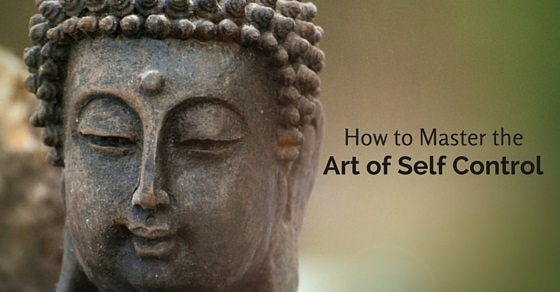You can completely change your life by learning how to control your willpower. Many times you fail on achieving your goals due to lack of self control. So if you are trying to quit smoking, lose weight or just watch less television to acquire more time to use it productively and haven’t succeeded in any of your efforts perhaps it’s because you need self control.
Your emotional response dominates your sense of logic and you lose power on making a decision. If you plan on winning on willpower, you must know how self control works. The following are few tips that help you to master the art of self control.
 Tips for Learning the Art of Self Control:
Tips for Learning the Art of Self Control:
1. Obstacles to self-control:
To become a master of self control you must pass the obstacles and channel your senses to better self controlling practices.
The obstacles can be the lack of knowledge and insight about self control, discipline, willpower, desire to change and advance and strong emotional outbursts, quick reactions to outside stimuli without consideration and believing that self control is an unpleasant activity.
2. List behaviors or habits you wish to control:
If people are advising you for a long time to change a habit or behavior, note it down. You need to be the one to make the decision for self control and channel your willpower and hence you must introspect to detect what behavior you need to alter.
You need to commit to yourself to bring about changes and exercise self control so as to truly alter your habits.
3. Handling the main problems first:
You need to be easy on yourself to start up controlling yourself. So scan through your list and understand what the biggest issue that you are dealing with is and which needs to be handled immediately.
For instance, if you are overweight and a chain smoker, you first need to deal with smoking habits and then after recovering choose a lifestyle with healthy habits like gym and healthy diet.
4. Take baby steps:
You may want to change many things or all of the things in your life. Changing all at once is impossible. And thus you need to keep small realistic aims to reach overall control on self.
Understand your lifestyle pattern, your time and ability to adopt the necessary changes. Everything will proceed step by step; however if you change all at once you will not succeed, causing you to feel like giving up.
5. Set time restrictions:
Control yourself from what you think are a problem and practice it for a week. Avoid indulging for a week and continue with this practice each week. You will find yourself being more self assured and trying it for a month.
If by the end of the month you have controlled yourself perfectly and have managed not to indulge in your previous impulsive habits, you will certainly not indulge back ever.
6. Identify your impulsive thoughts:
You need to have strategies that will help you resist temptation of something spontaneously. List down all the behaviors you will like to control and the moments that trigger the behavior often.
You will learn to suppress action from urge of something if you identify the moments when you feel like doing something impulsively.
7. Divert your thoughts:
Exercising self control may irritate you. You need to keep up the energy by maintaining your diet and health. Avoid anything that is irritating you or you will lose self control.
Find things to do that can keep you busy during your free time. At times it is helpful to do something with your hands, like knitting or texting a friend etc.
8. Try deep breathing:
When you are craving to do something which is your problem habit, you may just set an alarm to 5 minutes and start deep breathing.
It will help you divert your mind and think of the craving as a sheer craving and not a necessity. Whenever you practice deep breathing and exhale, picture your crave leaving your thoughts.
9. Generate difficulties:
You need to create a surrounding that will disable your access to things that you want for instant indulgence.
For instance, if you are a chain smoker, avoid buying cigarettes and avoid meeting up people who smoke. If you are shopaholic, you can dispose off your credit card to hinder your next urge to shop stuffs.
10. Dread your habit:
You need to think about the consequences of the habit you hold. If you eat lots of junk food, think about an obese or even keep a picture of one to scare you off your habit. Alter your patterns with fear. You can override temptation with proper strategies.
11. Alternate behavior:
Have an alternative action to distract you from acting on the impulsive thoughts. For instance, if you are trying to lose weight then you can suppress the urge of eating food by exercising or going to gym. Or if you are a shopaholic, you may go to park or some green area where it will be hard for you to find a shop.
12. Do some research:
You can educate yourself about how others in similar situations, as you, made changes in their lives to overcome their habits and exercise self control. Talk to people or search the internet for information about how to change a particular habit.
13. Surround yourself with highly self controlled people:
When you surround yourself with self controlled people and team up with them, it becomes a motivating strategy and you will be influenced to follow such people.
The last thing one would want, in the attempts to reach an important aim, to be pushover by fellow people who are as impulsive as you towards a habit.
14. Track your actions:
Maintain a journal and track all of your strategies and progress that you are making. This will help you understand what strategies works well for you in controlling yourself.
15. Keep an honest account:
You need to be honest with yourself and understand why you feel the way you do. When you are aware why you get the impulsive feelings you will better understand how to control them.
For instance, if you are suffering from a habit of overeating, comprehend how you feel when you overeat. Does stress make you overeat or nervousness? Do you overeat when you are happy or depressed?
16. Keep track of your progress:
Maintain a journal and calendar dedicated to your progress on changing habits and self controlling. If you had days where you felt everything was in control, mark it on the calendar and even mark the days when you lacked self control.
Note down on your journal why you failed on the days and how you succeeded when you did. You will understand how to deal with future situations with this practice.
17. Encourage yourself:
Have clear reasons and notions why you intend to take control of your actions and keep yourself reminded of those persistently. You can add these motivating factors to your journal to keep you going.
When you keep reminding yourself about the positive consequences of quitting a troubling habit, you will surely motivate yourself.
18. Develop new pursuits:
If you are good in painting, dancing perhaps interested in sports or driving and riding, etc then you can pursue this interest and be lost in it. Developing new hobby can prove to be very effective in distraction while you carry out self control.
19. Seek groups on social media:
There are groups on social networking sites where you can find people sharing the same interests as you. You can meet up these people and follow the freshly developed hobby. This even helps you remain committed to your practice of self control.
20. Remain focused and positive:
You need to encourage yourself to bring the drastic changes in your life. Your ability to control yourself gets influenced by the positive attitude you hold.
Do not feel discouraged or demoralized when you fail to reach your aims. Your focus must be to continuously make the effort to master self control.
21. Draw on support system:
Make your friends and family aware that you are striving to change your behaviors. You need to ask if you can contact them when you will need them, in the process for support.
While most of the self control will be gained by empowering yourself, taking other people’s suggestions, letting them motivate you, talking to them when you require will help you to strengthen your decisions to bring change.
22. Keep rewards for yourself:
For your attempts of bringing change and exercising self control, you must reward yourself. With this practice of self rewarding, you get motivated to replace the old habits with the new healthy behaviors.
23. Understand when to find help:
Although changing your life and developing control on self can be a significant and ambitious aspect of your life, there may be times when just your willpower will not be enough and you would require help.
24. When to seek professional help:
In the process of feeling in charge of your life and the choices you make, you may find yourself struggling and trying to control things which are turning to become something dangerous.
In these times, you may need a professional’s help and support to guide you through the process. For instance, you may be struggling hard on quitting alcohol, trying to control anger however ending up hurting yourself or others.
25. Calm your nervous system:
Some practices like doing yoga or controlled breathing can help you control your muscles, listen to soothing music and understand your body’s environment by checking your heart rate, pains, muscle tension etc.
You help your nervous system to be calm and stress free. Laughing is another good option for calming nervous tension.
26. Use digital support:
There are plenty of apps that help you in your routine to control your behaviors. For instance, you have diet apps, workout apps or tracking apps that track your money flow. Using these apps can be beneficial to stay committed to your goals.
27. Escape from decision fatigue:
Researchers have established that after people make plenty of decisions, their willpower gets used up and ultimately self control gets compromised. Exhaustion from decision making can have negative effects on our decisions.
For instance, out of exhaustion people might take an irrational decision due to impulse or take no decisions at all. Avoid taking decisions by the end of the day as you are already exhausted with the plenty of decision making throughout the course of a day.
28. Have lemonade regularly:
Psychologists state that glucose plays a vital role in self control which is the chemical in the bloodstream that transmits energy to the brain and muscles plus the other organs and systems.
The acts of self control usually decrease the level of blood glucose which in turn will result in poor performance on self control practices. Thus replenish glucose with lemonade to fortify your ability of self control.
Conclusion:
You are not going to see instant changes in your life, so remain calm and patient. Sleep well to eliminate the stress of constant contemplation about your behavior.
Keep a slight punishment system, such as if you caught yourself nail biting, do something as a tiring or boring chore or chew gum to keep reminding yourself not to fall prey to the behavior again.
Do not hate yourself if you make mistakes or fail. Nobody is perfect and all make mistakes, it is all about how you go on and ultimately gain self control.










































